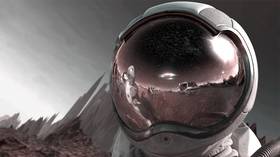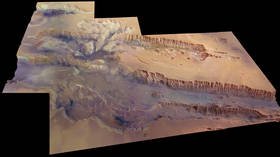NASA looks to religious scholars for answers

A NASA-funded program had theologians and academic scholars discuss the potential societal impact of the discovery of alien sentient life
UPDATE : This article was amended to clarify that NASA did not hire the religious scholars, rather it partly funded a program in the Center of Theological Inquiry in 2015
A NASA-funded program had enlisted the help of theologians to examine how the world would react if sentient life was found on other planets and what impacts such a discovery would have on deeply held beliefs about divinity and creation.
Some 24 scholars participated in the program at the Center of Theological Inquiry (CTI) in Princeton, New Jersey, according to Andrew Davison, a priest and theologian at Cambridge University. Davison, who holds a PhD in biochemistry, told The Times that he was part of the program’s 2016-2017 cohort. His upcoming book, ‘Astrobiology and Christian Doctrine,’ set to be published in 2022, is expected to cover some of his work with CTI and NASA, the paper reported.
NASA provided a $1.1 million grant in 2015 to CTI for the project, called ‘Inquiry on the Societal Implications of Astrobiology,’ which would see a “resident team of visiting scholars in theology, the humanities, and social sciences” conduct an “interdisciplinary inquiry” on the potential impact of finding life beyond Earth, according to a 2015 press release. The agency also noted that the scholars involved, or those receiving funding, were not employees or advisers.
According to the Daily Mail, the program was apparently aimed at answering such big picture questions as “what is life? What does it mean to be alive? Where do we draw the line between the human and the alien? What are the possibilities for sentient life in other places?”
An unnamed NASA spokesperson told the Associated Press that the space agency has looked to address similar topics since 1998, adding that the NASA-funded portion of the program had ended in 2017.
In The Times interview, Davison said he and his colleagues examined how each of the world’s major religions would likely respond if they were made aware of the existence of aliens. He later told the AP that he was not “hired directly or paid a salary” by NASA or CTI.
Davison had earlier noted in a blog post on Cambridge that “religious traditions” were an “important feature in how humanity would work through any such confirmation of life elsewhere.”
CTI Director Will Storrar had told The Times that NASA’s goal for the program was “serious scholarship being published in books and journals” to address the “profound wonder and mystery and implication of finding microbial life on another planet.” He also noted that the purpose of the program was not to advise NASA.
“We may not discover life for 100 years. Or we may discover it next week,” a NASA expert told the paper, which added that the agency’s growing “astrobiology” department has been looking for new answers to age-old questions for some 25 years.
Other religious figures, including the Bishop of Buckingham Alan Wilson, Rabbi Jonathan Romain of Maidenhead Synagogue, and Imam Qari Asim of the Makkah Mosque in Leeds, told The Times that Christian, Jewish, and Islamic teaching would not be affected by the discovery of alien life.
Meanwhile, Carl Pilcher, a former head of NASA’s Astrobiology Institute, had said that the agency was “giving an increased emphasis to questions which before the 20th century had largely been the preserve of philosophy and theology and religion.”













